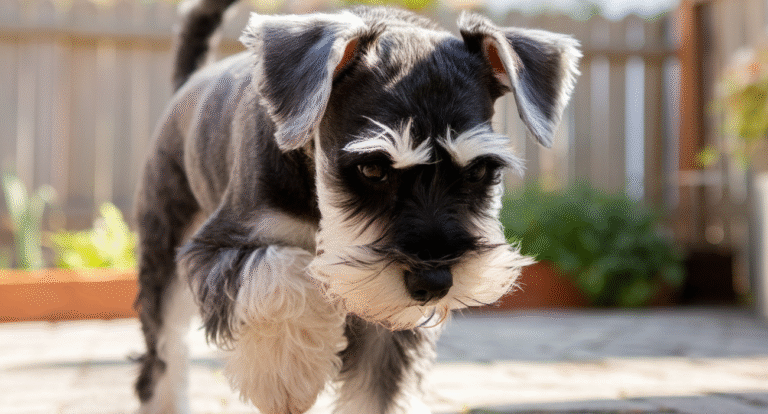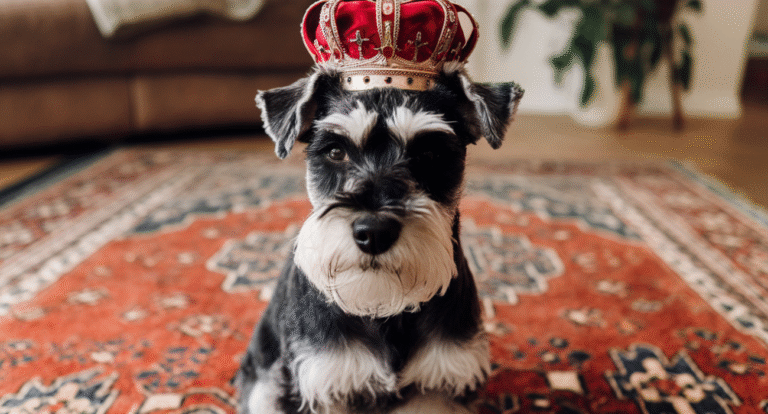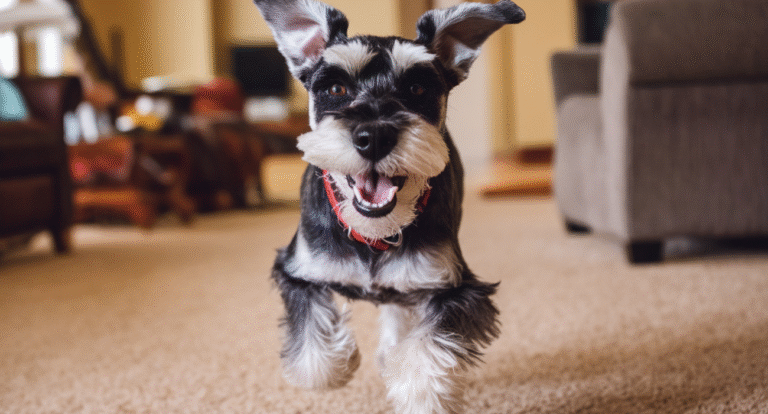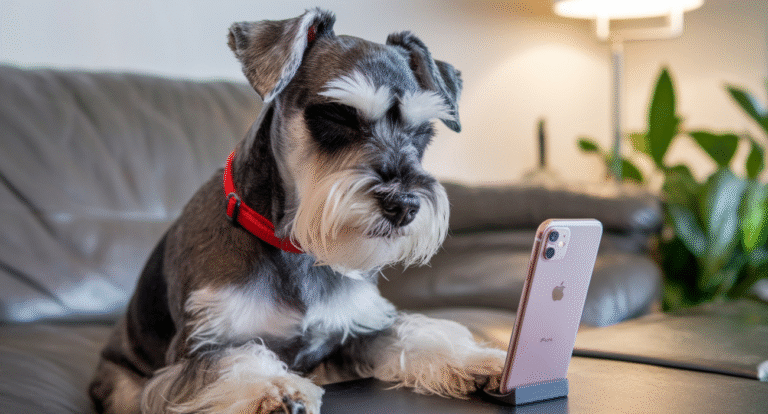Think you know Schnauzers? Some so-called “facts” are total myths. Find out which ones are completely false and misleading.
You’ve probably heard them at the dog park, read them on social media, or had your well-meaning aunt forward them in an email chain. Schnauzer “facts” that sound authoritative but fall apart faster than your pup’s favorite squeaky toy. These bearded beauties have accumulated more myths than a Greek epic, and today we’re busting them wide open. Grab your schnauzer (or just imagine petting one) because we’re about to separate fuzzy fiction from fuzzy reality.
1. “Schnauzers Don’t Shed”
Let’s start with the big one, shall we? This myth is repeated so often it might as well be engraved on stone tablets. Sure, schnauzers are low shedding compared to your average golden retriever who seems to produce enough fur to knit a second dog, but claiming they don’t shed at all is pure fantasy.
Their wiry double coat does trap loose hair rather than depositing it all over your black pants, but that hair doesn’t just vanish into the ether. It stays in the coat until you brush it out or until it eventually works its way free. Anyone who’s ever groomed a schnauzer knows the truth: there’s definitely hair coming off that dog.
The “non-shedding” myth persists because it sounds convenient, not because it’s accurate. Every dog with hair sheds to some degree. Physics demands it.
2. “Schnauzers Were Bred to Hunt Rats in German Breweries”
This one sounds so specific and charming that people accept it without question. German breweries! Rats! What a delightful origin story! Except the reality is more complicated and far less Instagram-worthy.
While schnauzers were used as ratters and general farm dogs in Germany, the “brewery” detail is largely exaggerated folklore. Standard schnauzers were versatile working dogs who guarded carts, herded livestock, and yes, caught vermin. But the idea that they had some special brewery employment contract? That’s creative storytelling, not historical fact.
3. “Miniature Schnauzers Are Just Shrunk-Down Standards”
If only dog breeding were as simple as using a shrink ray. The miniature schnauzer wasn’t created by selectively breeding the smallest standard schnauzers until someone yelled “That’ll do!”
Miniature schnauzers are actually a separate breed created by crossing standard schnauzers with smaller breeds, likely including the Affenpinscher and possibly miniature poodles. They’re not scaled-down versions; they’re their own distinct breed with a different genetic makeup and, in some cases, different temperament characteristics.
| Schnauzer Type | Average Weight | Primary Original Purpose | Coat Varieties |
|---|---|---|---|
| Giant Schnauzer | 55-85 lbs | Driving cattle, guarding | Black, Salt & Pepper |
| Standard Schnauzer | 30-50 lbs | Farm work, ratting, guarding | Black, Salt & Pepper |
| Miniature Schnauzer | 11-20 lbs | Companionship, ratting | Black, Salt & Pepper, Black & Silver, White |
4. “They’re Naturally Aggressive and Make Terrible Family Dogs”
This ridiculous claim probably stems from the fact that schnauzers are alert and vocal, which some people interpret as aggression. Spoiler alert: barking at the mailman doesn’t make your dog aggressive. It makes your dog a schnauzer.
Properly socialized schnauzers are fantastic family dogs. They’re protective without being dangerous, energetic without being destructive, and they bond strongly with their people. Yes, they can be stubborn (we’ll get to that), and yes, they’ll announce every leaf that dares to move in the yard, but aggressive? That’s nurture, not nature.
5. “Schnauzers Hate Other Dogs”
Another myth born from misunderstanding breed characteristics. Schnauzers can be selective about their canine friends and may have a strong prey drive toward small animals, but blanket statements about them hating all other dogs are absurd.
Like humans, schnauzers have individual personalities. Some love every dog they meet, others prefer a small circle of trusted friends, and some are definitely the “I came here to be with my human, not make friends with your labradoodle” type. That’s preference, not hatred.
6. “You Must Hand-Strip Their Coat or It Will Be Ruined Forever”
The grooming zealots want you to believe that if you dare use clippers on your schnauzer’s coat, you’ll somehow destroy its texture for all eternity and possibly upset the grooming gods. While hand-stripping (plucking dead hair) does maintain the ideal wiry texture better than clipping, your pet schnauzer will survive just fine with regular clipper cuts.
Unless you’re showing your schnauzer in conformation events, the grooming method is entirely your choice. Your dog’s coat texture might soften with clipping, but your dog won’t spontaneously combust.
Show dogs? Yes, hand-strip them. Your beloved couch companion who will never see a show ring? Do what works for your schedule, budget, and sanity.
7. “White Miniature Schnauzers Aren’t ‘Real’ Schnauzers”
Breed purists love this one. Because white miniature schnauzers aren’t accepted by all kennel clubs in all countries, some people act like they’re cryptids or elaborate hoaxes.
White miniature schnauzers are absolutely real, they’re just not universally recognized for showing purposes. They’re the result of recessive genes present in the breed, not some genetic aberration or mixed breeding gone wrong. They’re still schnauzers, they still have that signature personality, and they still judge you silently when you’re eating snacks without sharing.
8. “Schnauzers Are Impossible to Train Because They’re Too Stubborn”
Confusing intelligence with stubbornness is a common mistake. Schnauzers are whip-smart, which means they learn quickly and they question whether your commands make sense. They’re not difficult to train; they just need a reason to comply beyond “because I said so.”
Positive reinforcement training works beautifully with schnauzers. They’re food-motivated, praise-motivated, and they genuinely want to engage with their humans. The “stubborn” reputation comes from people who expect blind obedience from a breed that was literally developed to think independently while working.
9. “They Don’t Need Much Exercise Because They’re Small”
Tell that to the miniature schnauzer bouncing off your walls at 9 PM. Size does not dictate energy level, and schnauzers across all three sizes are energetic, athletic dogs who need regular physical and mental stimulation.
A bored schnauzer is a destructive schnauzer. These dogs were bred to work, which means they have stamina and drive that doesn’t disappear just because you live in an apartment. Daily walks, play sessions, training games, and mental enrichment aren’t optional extras; they’re requirements for a happy, well-behaved schnauzer.
10. “Schnauzers and Cats Can Never Live Together Peacefully”
This myth assumes all schnauzers have an uncontrollable prey drive that transforms them into cat-seeking missiles. While it’s true that some schnauzers have a higher prey drive than others, plenty of schnauzers live harmoniously with cats.
Success depends on proper introductions, individual temperament, and early socialization. A schnauzer raised with cats from puppyhood will generally accept them as family members rather than squeaky toys. Even adult schnauzers can learn to coexist with feline roommates with patience and proper management.
11. “The Breed Name Means ‘Snooty Nose’ in German”
Adorable theory, completely wrong. “Schnauzer” comes from the German word “Schnauze,” which means snout or muzzle. There’s nothing about attitude or snootiness in the etymology, though anyone who’s met a schnauzer might argue the name accidentally became accurate anyway.
The breed was named for its distinctive bearded snout, not for any perceived personality traits. Though let’s be honest, if you were going to name a dog breed for having opinions about everything, schnauzer wouldn’t be a bad choice.
12. “Giant Schnauzers Are Just Bigger Versions of Miniatures”
Beyond the obvious size difference, giant schnauzers are temperamentally quite different from their smaller cousins. They were bred for serious working roles like cattle driving and guarding, which means they have higher intensity, stronger protective instincts, and different training needs.
While miniature and standard schnauzers can thrive as relatively easy-going family companions, giant schnauzers need experienced handlers who understand working breeds. They’re not “miniatures, but giant”; they’re powerful dogs with serious job histories who happen to share a family resemblance.
Thinking all schnauzers are interchangeable except for size is like assuming all humans are the same except some are taller. Breed varieties exist for reasons beyond aesthetics.
13. “They’re Hypoallergenic, So Anyone Can Own One”
The final myth on our list might be the most potentially harmful. No dog is truly hypoallergenic, including schnauzers. They produce less dander than many breeds and their coat traps allergens better than freely-shedding coats, but they still produce the proteins that trigger allergic reactions.
People with mild dog allergies might do fine with a schnauzer, while others will still react. The “hypoallergenic” label creates false hope and sometimes leads to heartbreaking situations where families adopt dogs they ultimately can’t keep. If you have allergies, spend extended time with schnauzers before committing to ownership, and consider allergy management strategies beyond just choosing a “hypoallergenic” breed.






